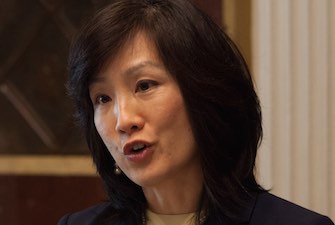
Michelle Lee, Under Secretary of Commerce and Director of the USPTO
On Tuesday, June 6, 2017, Under Secretary of Commerce for Intellectual Property and Director of the Patent and Trademark Office Michelle Lee submitted a letter of resignation. Although the e-mail she sent to all USPTO employees did not specify whether her resignation was immediate, and the USPTO has not yet responded to inquiries surrounding her resignation, it does seem as if Lee’s resignation was effective immediately. See USPTO Director Michelle Lee Resigns.
“We thank Michelle Lee for her service to her country and to the Department of Commerce,” said Commerce Secretary Wilbur Ross in a brief statement. “As the first woman in our country’s history to serve as Director of the United States Patent and Trademark Office, Michelle has worked tirelessly to serve our stakeholders and the American public. We wish her well in her next endeavor.”
Speculation will now turn to her replacement, who will run the USPTO an interim basis, and what this will mean from patent policy under the Trump Administration. In order to put this all into perspective we’ve reached out to a panel of well informed industry insiders for their thoughts on Lee’s tenure, her sudden resignation, and for speculation about possible successors.
As for my take — the legacy of Michelle Lee will be extremely complicated. She has been loved by those in the tech community most associated with using patented technologies (i.e., infringers) and reviled by innovators who need strong patent protections. Her speeches have always been full of rhetoric that leads many observers to believe she is not in favor of strong patent rights, so her departure will undoubtedly be welcome in many corners of the industry and could signal a new pro-patent approach on the horizon for the Trump Administration.
 Alden Abbott
Alden Abbott
Heritage Foundation
With the resignation of Michelle Lee, the Trump Administration must choose what sort of individual they want to set IP policy at PTO. The Administration should focus on individuals who are firmly committed to the promotion of strong American IP rights, which are a core aspect of private property. At a time of falling U.S. rankings in economic freedom (see the 2017 Heritage Index of Economic Freedom) and IP protection (see the U.S. Chamber of Commerce’s 2017 International IP Index), when strong IP is more important than even to economic growth and innovation, yet American patent rights are weakening, the ideal candidate would be dedicated to advancing policies aimed at strengthening American patent protection.
Alden Abbott serves as Deputy Director of Edwin Meese III Center for Legal and Judicial Studies at The Heritage Foundation.
 Stephen Kunin
Stephen Kunin
Partner, Oblon, McClelland, Maier & Neustadt, L.L.P.
I have heard from some reliable sources that Secretary Ross held a second round on interviews for candidates for the USPTO Director job. I understand the people given second interviews included patent litigation attorneys from Fish & Richardson, Seed IP and Irell & Manella. It may be the case that the Secretary has made a final decision on his recommendation to the President for the new Director. Peter Thiel and Darrell Issa have been strong supporters of Director Lee, but her announcing her resignation leads sources to believe that the Administration is proceeding to move in a new direction.
Stephen Kunin serves as an expert witness and consultant on patent policy, practice and procedure. Mr. Kunin served three decades at the USPTO, including 10 years as Deputy Commissioner for Patent Examination Policy.
 James Edwards
James Edwards
CEO, ELITE Strategic Services
This is a much-welcome departure. Michelle Lee’s actions have spoken more loudly than her words. She oversaw the furtherance of turning the PTO into an unfriendly agency toward inventors and patent owners — and friendly toward patent infringers and antipatent advocates. For instance, how she implemented the PTAB such that its patent invalidation rate and providing repeated opportunities for infringers and speculators to game the system is unconscionable. Her pleasant words about innovation in speeches and so forth thus have rung hollow. Ms. Lee seems to be a smart, pleasant person, but the Google antipatent taint never left her. And the fact of her being an Obama administration holdover certainly hasn’t given any comfort that she would right the ship of the PTO. So, I’m glad to see her leave.
Jim Edwards consults on intellectual property, health care innovation, and regulatory and policy issues. Edwards served as Legislative Director to Rep. Ed Bryant, R-Tenn., then a member of the U.S. House Judiciary Committee, and handled IP legislative matters. Edwards also worked on the staffs of Rep. John Duncan, R-Tenn., the U.S. Senate Judiciary Committee, and Sen. Strom Thurmond, R-S.C.
 Joff Wild
Joff Wild
Editor in Chief, IAM Magazine
It was a surprise that Michelle Lee stayed on at the USPTO when the Trump administration took over and it is a surprise that she has suddenly decided to quit now. Expect to see her emerge as either a law firm partner or a senior in-house counsel sooner rather than later. Lee’s departure will spark a fierce fight as Commerce Secretary Wilbur Ross seeks a permanent successor. While many in the US patent community will be pleased to see her go, as they believe she has presided over a regime that has deliberately and effectively undermined patent rights, others will be very worried about what comes next – this will particularly be the case among many of the larger technology companies. Only recently a group of them – including Amazon, Facebook, Google and Samsung – wrote to President Trump and Secretary Ross urging them to leave Lee in place or to appoint someone who will continue the work she began at the agency. You can see why: the Supreme Court’s Cuozzo decision in 2016 made clear that the USPTO Director has substantial power to revise the rules under which the Patent Trial and Appeals Board operates, while a new director could also choose to revisit examination guidelines created in response to recent Supreme Court judgments such as Alice and Mayo. Any moves away from the status quo to a more patentee-friendly approach at the PTAB and among the examiner corps would be very unpopular in many parts of Silicon Valley. Conversely, from the perspective of companies operating in other sectors, such as the life sciences, they might be very welcome.Thus, whoever does end up with the USPTO director’s job permanently stands to have a fair bit of power; and they are probably going to be able to do much as they like without having to worry too much about being second-guessed further up the government chain. Depending on the identity of the individual, that could mean steady as it goes or radical change. Expect extreme lobbying as a result and perhaps open dissent prior to a confirmation process should a nominee unpopular in certain quarters finally emerge. The USPTO Director’s job is political in a way that it has never been before. If left to themselves, those with the deepest pockets may end up deciding who gets to shape the US’s patent environment over the coming years; so if you feel strongly about this, your best bet is to hold your breath and get down deep into the swamp!
Joff Wild is Editor of the IP Division of Global Business Media Group. He has overall editorial responsibility for a number of titles and events including Intellectual Asset Management (IAM) magazine, World Trademark Review and the IP Business Congress.
 Matt Levy
Matt Levy
Patent Policy & Litigation Consultant
It’s disappointing to have Michelle Lee’s tenure end so strangely and suddenly, because her time as Director has been very positive for the USPTO. She pushed initiatives that made some great progress towards improving patent quality and overall improved the functioning of the Office. Michelle oversaw the creation of the new AIA post-grant review procedures and just generally left the Office in better shape than she found it.
I hope that whoever her replacement eventually is can put the interests of the patent system ahead of any particular industry.
Matt Levy is the former Patent Counsel at the Computer and Communications Industry Association (CCIA). He is now a consultant on patent policy issues and patent litigation.
Brian P. O’Shaughnessy
President, Licensing Executives Society
The Licensing Executives Society (USA and Canada), Inc. (LES) is deeply grateful to Director Lee for her leadership of the U.S. Patent and Trademark Office these past two years. Director Lee assumed the helm of the USPTO in a time of great uncertainty. The implementation of the AIA was still very much a work in progress. The USPTO was still devising and ramping up complicated new proceedings, and hiring staff to conduct those proceedings. At the same time, courts were rewriting precedent in patent law that was seemingly long settled and well established. Director Lee met those challenges with great skill, professionalism, and laudable transparency.
Now, the Administration must appoint Director Lee’s successor. LES urges the Administration to do so promptly. The US patent system is a potent economic engine. It stimulates a disproportionate amount of new business formation, job growth, and investment. The Administration should appoint a Director committed to protecting IP as the property right our nation’s founders envisioned, and who has: (1) first-hand experience of at least 25 years in the procurement, and enforcement and/or commercial exploitation of IP rights; (2) a commitment to the prompt examination and issuance of patents of the highest quality; and (3) a thorough understanding of the role of US patent law in the world of international trade. Regrettably, recent changes, both legislative and precedential, have chipped away at the US patent right. Meanwhile, patents from other countries are increasingly perceived to have greater value. Above all, we need a USPTO Director dedicated to reviving the US patent system as one of the best in the world, and one that is capable of producing IP rights that are definite, durable, and reliable.
Brian O’Shaughnessy is president and chair of the board of the Licensing Executives Society, Inc. (USA and Canada) (LES). He is also a partner with Dinsmore & Shohl LLP in Washington, DC.
 Charles Macedo
Charles Macedo
Amster Rothstein & Ebenstein LLP
Michelle Lee was in charge of the US Patent and Trademark Office during tumultuous times. She inherited the Office after the departure of a very popular and successful administrator and his protégé. She was charged with numerous difficult tasks, including implementing the controversial AIA, an ever changing law of patent-eligibility, addressing other significant changes in the patent law arising from disagreement between the Judges at the Federal Circuit and the Justices as the U.S. Supreme Court, as well as addressing landmark decisions in trademark law also coming from the Federal Circuit and U.S. Supreme Court. She was one of the few Obama appointees who continued to serve under the new Administration, which presented its own unique set of challenges. Through it all she served the public with grace and poise. May she have the best of luck in her next endeavor and her successor have smooth sailing when the mantle is assumed.
Charles Macedo is a partner with Amster Rothstein & Ebenstein LLP. He litigates in all areas of intellectual property law, including patent, trademark and copyright law, with a special emphasis in complex litigation and appellate work.
 Paul Morinville
Paul Morinville
Managing Director, US Inventor
I don’t know all of the reasons why Michelle Lee’s tenure at the USPTO was so controversial. But one is certainly her perspective. The AIA created the PTAB and changed a property right into a public entitlement despite 220 years of precedent, black letter law and the Constitution. Successfully managing a change of this magnitude would be nearly impossible for anyone, Michelle Lee included. However, I think the root of Michelle Lee’s magnificent failure was her perspective.
She was a multinational corporation’s lawyer working for Google before she took the job at the PTO. After obtaining patents on their search algorithm Google grew to have a dim view of patents, and massively commercialized a wide range of technologies without even considering what was patented and owned by others. So it’s not surprising that Google attracted a lot of patent infringement suits. Michelle Lee’s perspective was undoubtedly formed as a result of defending Google against these suits.
But Michelle Lee had not worked enough with small inventors and startups trying to fund their company when the only asset they have to attract that funding is a patent. When she formulated the policies that drive the PTAB and examination under Alice, the only perspective she knew was that of a multinational infringer that didn’t care what patents they infringed. So her polices naturally protected multinational infringers. Michelle Lee could not have known how damaging these policies would be for small inventors and startups because she had no experience there. The next Director must have experience with small inventors and startup where patents matter to the funding of the company. If not, we will continue on this very damaging course all the while thinking we are doing the right thing.
Paul Morinville is Managing Director of US Inventor, Inc., which is an inventor organization working in Washington DC and around the US to advocate for strong patent protection for inventors and startups.

 Warren Tuttle (left)
Warren Tuttle (left)
John Calvert (right)
United Inventors Association
The primary concern for the independent inventor community during Michelle Lee’s tenure as USPTO Director has been the administration of a PTAB system run amok, invalidating significant portions of 90% of the issued patents brought before a tribunal which has lost it’s credibility among key shareholders. The result has been an inexpensive path for infringers to bypass the traditional court system, lessen the historic value of Intellectual Property and promote uncertainly in the capital funding of innovation. This seems 100% contrary to the core purpose of the institution our founding fathers created to assist, not prevent, US innovation and economic growth. Our hope is the next USPTO Director will narrow the scope of the PTAB process and reign in the current excesses, focus on supporting organic innovation, and maintain a fair playing field for innovators and investors to once again place their trust in the US patent system.
Warren Tuttle is President of the United Inventors Association. John Calvert is Executive Director of the United Inventors Association.
 Ron Cahill
Ron Cahill
Nutter McClennen & Fish LLP
Certainly, Director Lee’s tenure at the USPTO has been marked by excellence in management, and excellence as a policy goal. Decisions around her replacement will necessarily involve balancing policy concerns among different industries. Director Lee, an electrical engineer by training and coming to government from Google, leaned toward the concerns of high tech industries, where patent infringement litigation by NPEs (Non Practicing Entities) is a significant issue. As a result, patents became more difficult to obtain and more easy to challenge during Director Lee’s tenure.
While also focusing on patent quality, life sciences industries tend to favor stronger patents, as their patents often protect the substantial investments they make in research and development in bringing life improving products to market. Many suspect that the current administration favors strong intellectual property protection for U.S. companies—the selection of the next USPTO Director gives the administration a visible opportunity to move in that direction.
Ron Cahill is partner and chair of the Intellectual Property Litigation practice group at Nutter.

![[IPWatchdog Logo]](https://ipwatchdog.com/wp-content/themes/IPWatchdog%20-%202023/assets/images/temp/logo-small@2x.png)

![[Advertisement]](https://ipwatchdog.com/wp-content/uploads/2024/04/UnitedLex-May-2-2024-sidebar-700x500-1.jpg)
![[Advertisement]](https://ipwatchdog.com/wp-content/uploads/2024/04/Artificial-Intelligence-2024-REPLAY-sidebar-700x500-corrected.jpg)
![[Advertisement]](https://ipwatchdog.com/wp-content/uploads/2024/04/Patent-Litigation-Masters-2024-sidebar-700x500-1.jpg)

![[Advertisement]](https://ipwatchdog.com/wp-content/uploads/2021/12/WEBINAR-336-x-280-px.png)
![[Advertisement]](https://ipwatchdog.com/wp-content/uploads/2021/12/2021-Patent-Practice-on-Demand-recorded-Feb-2021-336-x-280.jpg)
![[Advertisement]](https://ipwatchdog.com/wp-content/uploads/2021/12/Ad-4-The-Invent-Patent-System™.png)






Join the Discussion
28 comments so far.
Tesia Thomas
June 8, 2017 10:11 pmAll you have to worry about is technically besting their search engine.
And, if they’re taking your patents then you obviously have that capability.
Tesia Thomas
June 8, 2017 10:07 pmAlso read this if no access to law 360…
http://www.chinapatentblog.com/blog/great-article-on-iplaw360-by-matthew-bultman-on-chinese-patent-litigation
Segmenting the market is a good strategy. Lack of rights in the US can be an effective double edged sword.
Tesia Thomas
June 8, 2017 10:06 pmThere are…
China!
https://www.law360.com/ip/articles/914779/china-becoming-more-attractive-for-foreign-patent-owners
angry dude
June 8, 2017 09:59 pmTesia Thomas @23
Dear Tesia Thomas,
There are NO “IP Laws” if your net worth is under 50 million dollars
and even then you might lose some…
Tesia Thomas
June 8, 2017 09:55 pm@angry dude
But, you could just go to other countries.
Trade secrets mean that if someone else comes up with it later then they can possibly own it.
Trade secrets are patentable.
https://ipwatchdog.com/2013/09/18/aia-oddities-trade-secrets-re-patenting-and-best-mode/id=45108/
Instead, claim your tech and cut your “enemy” off by segmenting the market.
Tesia Thomas
June 8, 2017 09:52 pmThey left China because of being attacked, the firewalls, and most of China doesn’t use Google because of Baidu.
If you create IP in China (and Europe, Japan, etc.) and sell it (create search) in the US market then Google will have to copy.
This means you stop giving them IP.
All your IP is their prior art.
And, BONUS, they can ONLY copy in US. So they have to change search for only the US or else infringe your IP in the other countries.
Eventually, the US search falls behind the search of Japan, China, Europe, etc. courtesy of your ingenuity so US ppl start using your search.
If Google challenges you then you win courtesy of no “Alice” in the other countries.
And, you can invalidate all of their IP in the US courtesy of “Alice”. Since a lot of their secret IP is US only.
Then your (everywhere else but US) patent portfolio becomes huge.
Anyone can use Google’s invalidated IP in the US and everyone can use your software IP in the US but who’s going to create a search engine for just the US?
Segment the market.
Right now Google is segmenting the IP laws US separate from everyone.) Make it so the market follows.
angry dude
June 8, 2017 09:32 pmTesia Thomas@21
I am not done inventing but whatever I’ll do will be done under trade secrecy
which means no publicity, no linkedin profiles, no nothing
It’s up to US government to restore the trust in patent system and it’s not gonna be easy…
I see no signs of it coming, not in the next 10 years anyway, and then I don’t care
Tesia Thomas
June 8, 2017 09:16 pm@angry dude
Building on prior art means everything has a predecessor and you either incorporate or transform that ancestral technology.
Right. I understand “flash of genius.” I’ve done that and thankfully with hardware.
…
“the (one of the) roots of the problem with the current system is that they take for granted that established monopolies like google can patent very minor incremental improvements to their products and therefore dilute patent system
This has to stop”
Exactly!!
But, I mean software inventors like you need to help Google dig its own grave.
If you’re really angry about your IP being infringed and stolen then band together with other inventors, pool resources, and start up in China.
I’m telling you that not every brilliant person from China wants to move here but they think USA is where the action is so they agonize through our Visa system.
And, there are tons of engineers at Google who are pissed off with being handed crappy projects by Google. Or, a ton of older, knowledgeable SWEs who face age discrimination. Or, a ton of minority software engineers who don’t fit into the SV culture.
You can probably poach people and attract even more diverse talent.
Channel your anger into competing. The best way to get your point across is to attack.
All of this, what I call a “preemptive strike,” in lobbying the government so hard is evidence that Google is worried about a startup outing them. So do it.
Validate their fears.
angry dude
June 8, 2017 09:04 pmTesia Thomas @18
“building on prior art” is not inventing
Invention assumes unobviosness which is more than just “building”
It’s a “flash of genius” if you want
the (one of the) roots of the problem with the current system is that they take for granted that established monopolies like google can patent very minor incremental improvements to their products and therefore dilute patent system
This has to stop
Tesia Thomas
June 8, 2017 07:36 pmA lot of Google patents don’t have international rights, especially the ones hidden until issuance.
And I’m sure the abstract concept of validity applies to a lot of what they actually do patent.
Just go to China. Patent there.
Then Google can’t steal and everything there is prior art against them.
Build a Chinese search engine.
Somehow China steals and hacks to get US military secrets. Well I’m sure they could use those talents and stay in their home country.
SV has a lot of China transplants and many of them are fed up with the lottery for visa.
I just don’t understand how Google survives its own software as abstract idea laws. Besides just not being challenged.
They need to be challenged.
Tesia Thomas
June 8, 2017 07:01 pmWhy don’t all software people just go to China, invent there, and then use their IP in the US?
Even use Google’s IP in the US?
A weak patent system doesn’t favor any patent holder under that jurisdiction.
We’re all building on prior art. Past building blocks. They have so many patents that if the foundation is attacked then you can make the whole thing come crumbling down.
B
June 8, 2017 05:52 pm“I wonder what role Michelle Lee’s hiding the fee increase and trying to push it in under the wire before Trump was inaugurated and then continuing to hide it from the Trump team afterwards,”
Paul – I recently talked to a fellow on the phone who pondered this same thing. What an amazing coincidence!!!
angry dude
June 8, 2017 03:36 pmDale B Halling@14
“That was evil, unconstitutional, unlawful and those in charge should have gone to prison”
Wow ! Such strong worlds… but I believe you
So where do the current bunch aka Michelle & friends in scotus, potus and elsewhere deserve to go then ???
To prison or straight to execution ?
Cause damage done under Dudas is nothing, I repeat, NOTHING, compared to current annihilation of more than 200-year old US Patent System
Dale B Halling
June 8, 2017 01:52 pmYou clearly are ignorant of the Dudas era. Dudas started a quality control program that equated rejections with quality. Examiners bragged that they had 100% quality because they had 100% reject rates for the year. That was evil, unconstitutional, unlawful and those in charge should have gone to prison.
Paul Morinville
June 8, 2017 01:43 pmI wonder what role Michelle Lee’s hiding the fee increase and trying to push it in under the wire before Trump was inaugurated and then continuing to hide it from the Trump team afterwards, and then copying and pasting the Obama budget into the Trump budget attributing Obama’s policy to Trump, and then diverting fees internally from examination to the PTAB played?
https://ipwatchdog.com/2017/03/08/uspto-breaks-president-trump-one-in-two-out-executive-order/id=79270/
https://ipwatchdog.com/2017/05/04/uspto-diverting-fees-subsidize-ptab-trials/id=82913/
https://ipwatchdog.com/2017/06/05/trump-bamboozled-obama-holdovers-patent-policy/id=84105/
I hope these are the real reasons. Might be a good lesson for Matal and whoever eventually replaces her permanently.
angry dude
June 8, 2017 01:30 pmDale B Halling @11
Hm… I would say “arbitrary judgement”, as much as it sucks, is still infinitely better than specific agenda written in SV corporate boardrooms…
angry dude
June 8, 2017 01:26 pmAnon @10
If someone had problems with PTO under Dudas then what about current PTO ???
Yes, the examiner initially rejected all of my independent claims, improperly combining prior art references I cited myself in IDS 🙂
It took a personal interview (and 4K to my attorney) to straighten him out
But at least we were not talking about “abstract ideas” and crap like that – only about combining prior art references (academic publications, not patents), some of which were non-analogous
PTO under Dudas was infinitely better than PTO today. Period.
(Not that the idiot deserves any credit)
Dale B Halling
June 8, 2017 01:14 pmDudas and company were criminals. They ignored the constitution and the law and substituted their arbitrary judgement – the essence of tyranny. Those are facts, not opinions.
Anon
June 8, 2017 12:59 pmangry dude,
With all due respect, I have to take issue with your post at 6 as showcasing again a lack of critical thinking and an opinion based too much on emotion,
That you personally obtained your patent and you personallydid not feel any ill effects ignored the actual history and the sheer size of the problems induced under the Dudas reign – I am of course speaking of the statistically inexplicable Reject-Reject-Reject regime.
Uninformed opinions simply are not all that helpful, and yours, falling as they do to merely reflecting emotion without thought, are of that not helpful type.
Gene Quinn
June 8, 2017 12:53 pmap @7-
I’ve heard that rumor as well. Secretary Ross has shot down that rumor, which doesn’t necessarily mean anything I know.
I personally find it impossible to believe that Lee left over a budget dispute. Lee was lobbying hard to keep the job and by all accounts wanted to stay in that position almost desperately. Recall that she started lobbying to keep the position back in 2016. So the thought that she would resign over a budget disagreement relating to shared services, which would cost the PTO at most a few millions of their $3.6 billion budget is just not believable.
It seems far more plausible that Ross informed Lee that she did not make the final cut and he was going to move to final interviews of a few candidates. She was given the opportunity, as is customary for C-level executives, to resign. She decided to resign and a narrative is being developed as to why she resigned that doesn’t rely on her not being offered the position. In short, this smells like a bunch of alternative facts in order to create the perception that she left on her own rather than being told her services were no longer needed/wanted.
-Gene
Anon
June 8, 2017 12:47 pmWhile everyone is certainly entitled to their own opinions, it is somewhat remarkable how much of a dichotomy exists with something as seemingly straight forward as whether or not a person did their job well.
I would posit that this reflects less of a “difference of opinion” on the person herself (Miss Lee), and more of a fundamental lack of understanding of what the patent system itself is meant to be.
When someone celebrates a weakening of patents as a good thing, then there are serious problems with understanding patent basics and why we even have a patent system in the first place.
Far, far, far too many have a “first view” of patents as bad things.
ap
June 8, 2017 12:31 pmUpdate:
Lee may have quit over diverting of fees from the PTO to Commerce.
http://www.politico.com/story/2017/06/07/lee-patent-office-funding-239279
angry dude
June 8, 2017 11:29 amDale B Halling @5
Please don’t badmouth dude named dudas – my patent has his signature
The prosecution process was more or less reasonable and no patent holder harassment was allowed back in those times
Granted it wasn’t his achievement but still…
Dale B Halling
June 8, 2017 10:23 amGood riddance – worst patent director since Jon Dudas. With that said it looks like the bi-partisan attack on the patent system will continue. Patents are the canary in the mine of property rights and freedom. The US will continue to slide economically as will its economic freedom score. In another generation at this rate, people in the US will talk about how the US use to be great – much like they do in England and Europe.
angry dude
June 8, 2017 09:42 am@Night Writer
“If you tell a lie big enough and keep repeating it, people will eventually come to believe it”
google (aka geobbels)-style propaganda
angry dude
June 8, 2017 09:37 amSend her on a slow boat to China…. to help destroy their patent system
– that’s all she can do
Night Writer
June 8, 2017 08:54 amAt least Gene you should require that he disclose where he gets his money and change his title, e.g., Matt Levy, Google propagandist. AKA as bought boy.
Night Writer
June 8, 2017 08:52 am>Matt Levy :because her time as Director has been very positive for the USPTO.
What we see consistently in these Google paid media consultants like Matt Levy is no substance. He doesn’t address any of the substance in the other opinions. He just pushes propaganda. I guess it is interesting to see what he has to say because we know it is coming from K Street and Google, but frankly I don’t think a person like this is fit to comment on this blog. He is clearly being paid to push a party line, so you are just giving voice to K Street and Google. You probably earn him at least $5,000 every time you put his opinion up.